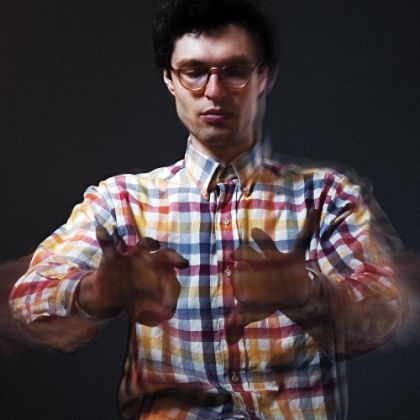Listen Magazine Feature
Igor Levit is one of the most striking pianists to emerge in a recently crowded field.
By Thomas May
It’s early February, over lunch before his Seattle debut later in the evening, and Igor Levit can’t stop talking about how thrilled he is to be touring the United States. It was only two years ago that the Russian–German pianist made his first U.S. appearance — choosing the unusually intimate venue of the Board of Officers Room at the Park Avenue Armory (seating for about one hundred fifty) — just a few days before jumping in at the last minute for Hélène Grimaud in a City of Birmingham Symphony Orchestra concert. (He did the same for Maurizio Pollini three months later.)
“I have colleagues who say, ‘I don’t care, I just make music.’ But I think that’s a false perspective to pretend you can be above it all — and a really dangerous one.”
To date, Levit has performed at just a handful of locations across the United States. The current tour follows up on some appearances in December, when he returned to the Armory to play the Goldberg Variations in the context of an installation created by Marina Abramović. In addition to Seattle, the tour is bringing Levit to San Francisco, Vancouver, Minneapolis, Raleigh, North Carolina, and Atlanta. “I’ve never been to the American South before,” he confesses, with a smile.
“If anything really inspires me, it’s the people I meet. The enthusiasm that the audience shows you here is so heartfelt and positive — and thoughtful,” says Levit. “I’m traveling from university town to university town, surrounded by people of my generation. What I love to do is meet people and listen to their stories. I just pull out my notebook and write as much of it down as I can.”
And the topic is hardly limited to music. Levit proudly shows me the website 60pages.com, a Berlin–based platform for free-form pieces by an international assortment of writers, artists, and scientists where he’s just published “Our Task.” It’s Levit’s portrait of the Ethiopian cab driver who ferried him from a Kalamazoo government. I have colleagues who say, ‘I don’t care, I just make music.’ But I think that’s a false perspective to pretend you can be above it all — and a really dangerous one.”
The conversation briefly turns to András Schiff as an example of an artist who takes his social and political responsibility seriously (as well as being one of Levit’s musical heroes). Schiff’s well-known decision not to set foot in his native Hungary, Levit points out, is his way of protesting the government of Viktor Orbán and its encouragement of what he believes is an overall atmosphere of xenophobia.
Levit’s social media footprint bears out his convictions. He regularly tweets (@igorpianist), and has become embroiled in discussions about the refugee issue in Germany, unequivocally voicing his support for the refugees. “I won’t make a statement just for the sake of a statement, but only if I feel it is the right thing to do.”
The pianist knows the experience of readjusting to an entirely new culture at a young age. Levit was eight when his family emigrated from his native Nizhny Novgorod to the east of Moscow and settled in Hanover, Germany. Levit and his family weren’t fugitives — they were among the wave of post-Soviet Jews encouraged by Chancellor Helmut Kohl to make a new home in Germany — but his sense of multiple identities has made him suspicious of narrow nationalisms.
“I won’t make a statement just for the sake of a statement, but only if I feel it is the right thing to do.”
The same applies to the inevitable fixation, within the music world, on identifying Levit with a particular national “school” of pianism. “Even if there is a school, I don’t care about it. My mother is of course a great influence, and she was a student of [the powerfully influential Soviet pianist] Heinrich Neuhaus. But my first important teacher in Salzburg was somebody Swedish, Hans Leygraf, and I later studied with a German [Karl-Heinz Kämmerling]. And another great pedagogue and close friend has been Matti Raekallio, a Finnish pianist. So I don’t feel that I am this or that as an artist. I am very open. I don’t like borders.”
If Levit brims with the political idealism eternally associated with youth, he has awed a wide array of European and American critics with the preternatural maturity manifested in his recording projects. It takes a certain kind of confidence to compete with the countless recordings of Beethoven already on the market. But to select the composer’s late sonatas as one’s official debut recording — a two-CD set of the last five sonatas Opp. 101, 106, and 109–11), released in 2013 — requires ratcheting that up by a few orders of magnitude. (Among the awards the recording garnered was ECHO Klassik’s Solo Recording of the Year for 2014.)
“I was curious, but dubious,” wrote Anthony Tommasini in his New York Times review of Levit’s U.S. debut at the Park Avenue Armory. “But when I listened to the album … I was astonished by the mature, commanding and richly detailed playing of this exceptional artist…. His superb live performance confirmed the impression of his recording: A major new pianist has arrived.”
The pianist knows the experience of readjusting to an entirely new culture at a young age. Levit was eight when his family emigrated from his native Nizhny Novgorod to the east of Moscow and settled in Hanover, Germany. Levit and his family weren’t fugitives — they were among the wave of post-Soviet Jews encouraged by Chancellor Helmut Kohl to make a new home in Germany — but his sense of multiple identities has made him suspicious of narrow nationalisms.
The same applies to the inevitable fixation, within the music world, on identifying Levit with a particular national “school” of pianism. “Even if there is a school, I don’t care about it. My mother is of course a great influence, and she was a student of [the powerfully influential Soviet pianist] Heinrich Neuhaus. But my first important teacher in Salzburg was somebody Swedish, Hans Leygraf, and I later studied with a German [Karl-Heinz Kämmerling]. And another great pedagogue and close friend has been Matti Raekallio, a Finnish pianist. So I don’t feel that I am this or that as an artist. I am very open. I don’t like borders.”
If Levit brims with the political idealism eternally associated with youth, he has awed a wide array of European and American critics with the preternatural maturity manifested in his recording projects. It takes a certain kind of confidence to compete with the countless recordings of Beethoven already on the market. But to select the composer’s late sonatas as one’s official debut recording — a two-CD set of the last five sonatas Opp. 101, 106, and 109–11), released in 2013 — requires ratcheting that up by a few orders of magnitude. (Among the awards the recording garnered was ECHO Klassik’s Solo Recording of the Year for 2014.)
“I was curious, but dubious,” wrote Anthony Tommasini in his New York Times review of Levit’s U.S. debut at the Park Avenue Armory. “But when I listened to the album … I was astonished by the mature, commanding and richly detailed playing of this exceptional artist…. His superb live performance confirmed the impression of his recording: A major new pianist has arrived.”
“To try to just get the perfect sound — that’s boring.”
And yet … no matter how secure and fine-tuned a technique one has acquired, does it make existential or even emotional sense to tackle these enigmatic monuments while still in one’s twenties? In fact, Levit is little inclined to even mention matters of technique. “To try to just get the perfect sound — that’s boring.” He prefers to steer the conversation toward issues of experience and what used to be called a “humanist” approach to art.
“Some people would tell me, ‘You’re too young, you shouldn’t have done it,’ but then I discover they haven’t even listened, they’ve made up their minds.” Levit compares this closed-minded attitude to snap judgments made without consideration of the musical merits of the artist. “I remember at the conservatory hearing discussions about a phone company commercial with Anna Netrebko apparently naked in the bathtub singing ‘O mio babbino caro.’ Some people would say, ‘How can she do it, that’s so embarrassing!’ But who has the right to say that? What does that have to do with the fact that she’s an incredible singer, a professional who delivers great opera?”
As for Beethoven: “There was never any question for me that this music would have to be recording number one. This is the most important repertoire I’ve been working on throughout my life and that I feel closest to. Nothing could feel more natural or honest to do.”
Levit is referring to his two subsequent albums as well, which, like the Beethoven sonatas, compose his discography to date as an exclusive Sony artist. Second in the lineup is an account of the six keyboard partitas of J.S. Bach (2014), followed in 2015 by a three-CD album comprising Bach’s Goldberg Variations, the Diabelli Variations (more late Beethoven), and The People United Will Never Be Defeated! — a third massive set of variations. The last, written in 1976 by the American composer and pianist Frederic Rzewski, boasts a kind of cult following and has attracted a fascinating diversity of interpreters (including Ursula Oppens and Marc-André Hamelin).
Levit speaks of the Diabelli Variations as a sort of capstone to the debut recording — and the key to his understanding of the mysteries behind the late Beethoven. “I first learned this piece very quickly at age seventeen. But I’ve lived longer with it than anything else. Since that time I’ve done my research, had all the experiences that happened to me so far — my emotions and what I think about — and I speak about it non-stop, to the point that it would annoy everyone around me. So I believe what comes of all that is you play your own interpretation. How can you avoid that? We talk about how the interpreter should step behind the piece, serve the piece, but that is total rubbish. I don’t want to be a slave and serve anyone. I believe it’s natural I should step in front of the piece.”
That isn’t to say Levit is proposing anything-goes subjectivity. Far from it. For his Goldberg Variations recording, for example, he follows all the repeats, and his meticulous search for the most expressive phrasing is rooted in his understanding of a piece’s architecture — as in the tenderly unfolding rainbow of arpeggios in the first movement of Beethoven’s “Tempest” Sonata (Op. 31, No. 1), which I heard him play in the Seattle debut program. Indeed, one of the most consistently fascinating aspects critics seem to home in on is Levit’s balance of rigor and personality.
The personality, in turn, is shaped by his open-mindedness and by what he acknowledges as a “stubbornness.” Discussing how he became close friends with Rzewski — who has been based for years in Brussels — Levit says this is a trait they both share, “although I’m quite a different personality.” One matter on which Levit insists is that Rzewski should be counted among the most significant living composers. He deliberately positioned The People United on his last recording by way of comparison, implying that Rzewski’s variations are the twentieth-century equivalent of the Bach and Beethoven — and very much on the same exalted level. “Most of the people who disagree with me are musicians who, frankly, don’t know the piece.” Levit compares this attitude to the hasty snap judgments he had mentioned earlier. “It’s an assumption. They think he can’t possibly be as good as Bach or Beethoven — as if music ended in the 1800s.”
Beaming with excitement, he mentions that Rzewski recently composed a new work for him: the second part of Dreams, a work inspired by the Akira Kurosawa film, which was commissioned by Wigmore Hall, Heidelberger Frühling Festival, and Carnegie Hall (as part of its ongoing 125 Commissions Project). Levit gave the world premiere of Dreams II during a three-solo recital series last summer at Wigmore Hall. He has programmed the U.S. premiere alongside the Diabellis for his Carnegie Hall debut, scheduled for February 2017.
The politically charged compositions of Rzewski and Cornelius Cardew are as crucial to Levit’s repertoire as his beloved Beethoven, Bach, Schubert, Debussy, and Ravel. At the same time, he generated a minor tempest by telling Fiona Maddocks in The Guardian: “When I sit down and play Chopin I find it, or maybe it is me, dumb.”
Levit keeps his ears wide open for creative achievements outside the classical sphere. “Kendrick Lamar is amazing. Someone like that who can really understand a great rhythm, a peak, a sense of where the phrase begins and ends is a master who knows exactly what he’s doing. There are few things greater than hip-hop. I was very hard hit by David Bowie’s death. Beyoncé’s last song [“Formation”] is fantastic. Bob Dylan, Leonard Cohen are also artists who I really admire. I listen to all kinds of music. If I read an article in a newspaper about someone who sounds interesting, I go on to find the music and listen to it.”
Although he made the move from Hanover to Berlin just a month ago, Levit’s inherent restlessness is obvious. He’s clearly charged by the energy of his travels — and by the sense that he’s reached a major turning point in his career. He put so much of himself into his first three recordings that he says he still feels “emptied out” and isn’t ready yet to talk about what lies ahead. For the time being he’s focused on continuing to engage with the people he meets in new cities.
“This time [in the United States] it’s even more exciting, and there’s this exciting progressive energy among the young people because of the election year. I love the feeling I get from them that there’s no longer this separation between the audience and the artist. People want to get very close. They contribute a lot.”
This article originally appeared in Listen: Life with Music & Culture, Steinway & Sons’ award-winning magazine.
-

Chang-Yong Shin — Musical Expression
Pianist ChingYong Shin on grappling with the Classical repertoire
Read More
By Ben Finane -

Crowd Favorite
Outsider pianist Lucas Debargue Revitalizes the classics.
Read More
By Brian Wise -

Disruption
Timo Andres tackles an unfinished Mozart concerto.
Read More
By Brian Wise